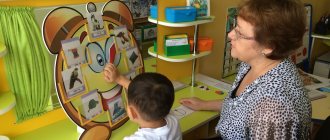“Forms of interaction between a speech therapist teacher and parents in a school environment” article on the topic
“Forms of interaction between a speech therapist and parents in a school setting.”
Interaction between school and family is a necessary condition for the full speech development of schoolchildren, since the best results are observed where speech therapists and parents act in concert. The concept of “interaction with the family” should not be confused with the concept of “working with parents”; although the second is an integral part of the first. Interaction implies not only the distribution of tasks between process participants to achieve a common goal. Interaction necessarily implies control, or feedback; At the same time, control should be unobtrusive and indirect.
The success of correctional education is largely determined by how clearly the continuity of work between the speech therapist and parents is organized. They should become employees, colleagues, assistants to each other, solving common problems.
The tasks of a speech therapist in interacting with parents:
- Establish partnerships with the family of each student;
- Join efforts for the development and education of children;
- Create an atmosphere of mutual understanding, community of interests, emotional mutual support;
- Activate and enrich the educational skills of parents, maintain their confidence in their own teaching capabilities.
The tasks of parents in correctional work with their children:
- Creating conditions in the family that are favorable for the general and speech development of children;
- Carrying out targeted and systematic work on the general speech development of children and the need to correct deficiencies in this development according to the recommendations of specialists.
To effectively solve these problems, the speech therapist teacher needs to know each family better, taking into account:
- the role of all family members in raising a child;
- type of family upbringing;
- the position taken by parents in relation to the child.
Parents have different demands on their children; some children experience a lack of communication with their parents, because most of the time children are in the care of their grandmothers or older brothers and sisters.
The most typical mistakes parents make in the process of developing and raising their children are:
- excessively negative assessment of the child’s activities;
- the spread of a negative assessment of aspects of the child’s activities to his entire personality, which can lead to the formation of an inferiority complex;
- negative emotional connotation of statements (sharp shouting, threatening intonation);
- contrasting the child, his affairs and actions with his peers, especially with healthy children;
- sharp transitions from parental only positive assessments to negative ones, from their punishing tone to affectionate cajoling.
If parents try to independently develop and correct their children’s speech, without the help of specialists, they often encounter the following mistakes:
- adaptation to the child’s incorrect speech;
- repeated repetitions of the same exercises;
— ignorance of special techniques for monitoring and correcting sounds;
- insufficient use of comparison and juxtaposition techniques;
— monotony of classes, conducting them without clarity, game techniques, didactic materials, creating appropriate situations;
- frequent reprimand and correction of speech without taking into account the place, time and emotional state of the child, inability to emphasize his successes, which causes psychological discomfort;
- ignorance of the child’s individual characteristics.
Therefore, it is necessary to carry out educational work, set up and attract the attention of parents to the child’s problem, help them perceive their child correctly, teach them to act together, and make the same demands for the successful correction of speech disorders.
An important role in the joint, complex work of the speech therapist and the family is played by questioning parents, which allows you to analyze the relationship between adults and children in the family and plan work with parents for the school year.
From conversations with parents, observations of the style of communication with children, analysis of the implementation of exercises on the instructions of the speech therapist, all parents can be divided into 5 groups:
Group I - parents who make fair demands on the child, listen to the advice of the speech therapist and teachers, systematically monitor the children’s performance of the speech therapist’s tasks, and are interested in the mood and success of their children.
Group II - parents who unreasonably praise the child, not wanting to notice impending problems; the speech therapist’s tasks are not always completed, mainly at the request and mood of the child.
Group III - parents who show no interest in the successes and difficulties of their children, formally relating to the advice and requirements of the speech therapist. Emotional contacts between parents and children of this group are minimal. The speech therapist's assignments are often not completed.
Group IV – parents who falsely create the impression of participation and interest, but in reality do not fulfill their promises, citing being busy and forgetful. The tasks are carried out formally.
Group V – parents who place high demands on their children; negative emotions, pressure and authoritarianism predominate in communication with them. The tasks are being completed.
Taking into account the individuality of each parent and his or her belonging to a certain group, the speech therapist teacher must rationally plan work with parents to correct their children’s speech. After all, when working with different families, you cannot use the same methods; they must be varied depending on the composition of the parents in terms of cultural, educational level, style of family education, type of relationships in the family, interest and understanding of their child’s problems, i.e. It is necessary to constantly look for new ways and means of involving parents in cooperation with teachers.
However, the basis of any interaction must be defined rules:
Rules for effective interaction between a speech therapist and parents
- Parents need support, help and good advice. If you have them, create the necessary conditions for communication with you!
- Do not talk to your parents in a hurry, on the run. If you don't have time, make an appointment for another time!
- Speak in a calm tone, do not try to lecture: this causes irritation and a negative reaction from parents!
- Learn to listen patiently. Give parents the opportunity to speak out on all pressing issues!
- Don't rush to conclusions. Think carefully about what you hear from your parents!
- What you were told about should not become the property of other parents, students and teachers!
- If there is a professional need to share confidential information, parents must be informed about this!
- Each meeting with the family should end with constructive recommendations for parents and the student himself!
- If you are incompetent in any way, you should apologize to your parents and encourage them to seek counseling elsewhere!
The entire correctional pedagogical process of interaction with the family includes three blocks: educational, advisory and correctional work itself.
The task of the educational block of correctional work with families is to familiarize themselves with the basic patterns of child development, with individual mental characteristics, with the facts and reasons that determined the violation of ontogenesis.
To eliminate the psychological and pedagogical illiteracy of parents, “Parent lectures”, “Family pedagogy clubs”, parent seminars, and “round tables” are organized.
The advisory block is represented by an individual form of work with the family. The organization of individual consultations and “helplines” should help parents find answers to existing questions and receive a system of recommendations for building favorable relationships in the family.
Individual consultations can be conducted by psychologists, speech therapists, doctors, and teachers. It is possible to consult parents at joint consultations with all specialists at once.
Actually, correctional work is aimed at creating optimal conditions in the family for the development and correction of the child’s speech. This block uses various traditional and non-traditional forms of working with parents.
Organization of work of a speech therapist with parents who have a child with a speech disorder.
Publication of newspapers for parents “Merry Family”. (The events of the group are covered, practical advice is given to parents).
Organization of exhibitions “How skillful hands helped the tongue.” (Only those exhibits that children made at home with their parents are presented).
Essays by parents on the topic “My child.” (Parents independently choose the content and topic, writing style, show creativity and imagination).
Issue of a magazine for parents “Govorushechki” (dedicated to the problems of a child’s speech development - grammatical structure, enrichment of vocabulary, preparation for learning to read and write, development of fine motor skills, articulation, etc.)
Posting information on websites intended for parents.
These forms of work make it possible to involve parents in active participation in the correctional process, presuppose the establishment of trusting relationships between teachers and parents, and awareness by parents of the role of the family in the education and upbringing of the child. A speech therapist helps determine forms of organizing home activities with a child - a speech pathologist.
The advantages of new forms and methods of interaction between teachers and parents are undeniable and numerous:
positive emotional attitude of teachers and parents to work together ( Parents are always confident that teachers will always help in solving pedagogical problems and at the same time will not do harm. Since they will take into account the opinion of the family and suggestions for interaction with the child. Teachers, in turn, gain understanding from parents in solving problems. And the biggest winners are the children for whose sake this interaction is carried out)
taking into account the individuality of the child ( the teacher constantly maintains contact with the family, knows the characteristics of each child and takes them into account when working, which, in turn, leads to increased efficiency of the pedagogical process)
strengthening intra-family ties, which, unfortunately, is also a problematic issue in pedagogy and psychology today
the possibility of implementing a unified program for the upbringing and development of children in preschool educational institutions and families
With a new approach to interaction with families, it is possible to avoid those disadvantages that are inherent in old forms of working with families. Looking at the results of their work pleases both children and, of course, their parents. They themselves begin to take an interest in the success of their children, offer help, control and focus on beautiful, correct speech.
Trusting and partnership relations between all participants in the correction process, not only the actual speech disorders, mental processes, and behavior in the child are successfully overcome, but also many intrapersonal conflicts and problems of parents are resolved, a favorable psycho-emotional climate is created in the families of children with developmental disabilities, and children's parental relationships.





